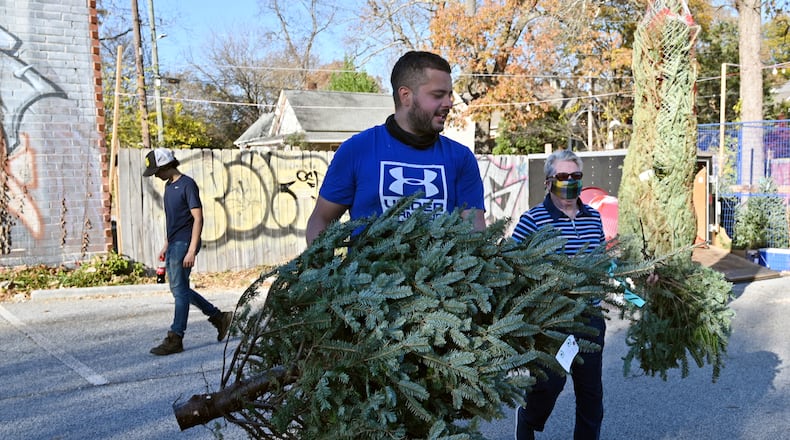In the parking lot of Cummin Landscape Supply on Memorial Drive, the chainsaws, netting machines and twine all sit at the ready.
But leaning against racks fashioned from wood pallets, the Christmas trees themselves are sparse. Less than 20 were left by Thursday afternoon, and owner Justin Andrews said he’d be surprised if any were left this weekend.
“We’re basically going to sell half of what we planned on selling this year,” Andrews said. “And the busiest weekend is this weekend and we won’t have any trees.”
In the 13 years Cummin has sold Christmas trees, Andrews said this is the earliest he will have ever run out.
Credit: HYOSUB SHIN / AJC
Credit: HYOSUB SHIN / AJC
As many people in Atlanta and across the country swap pumpkins and gourds for Christmas lights, actual trees to hang them on may be harder to find this holiday season. Some sellers around the metro area who spoke with the AJC said they’ve not been able to get as many trees as in years past.
Keith Johnson, the owner of NorthStar Christmas Trees, said he had just unloaded 600 trees on his lot in East Atlanta on Thursday. He expects to sell all of those by the end of this weekend and he isn’t sure if he’ll be able to get another shipment. If he doesn’t, he will likely sell just over 1,000 trees — far less than the 1,500 he’d hoped for this season.
“This (weekend) may be it for us,” he said.
The reasons behind the limited supply this year are complicated, with retailers and industry trade groups offering different explanations. Some say the same supply chain issues that have plagued deliveries during the pandemic are also affecting Christmas trees. Even artificial trees may be harder to find due to shipping snags, according to media reports.
One of the most acute problems affecting tree deliveries is the nationwide shortage of truck drivers, said Jami Warner, the executive director of the American Christmas Tree Association, a nonprofit representing tree producers and retailers.
But Warner says that’s not the entire story. Extreme weather fueled by climate change that’s struck major tree-producing states in recent years is also contributing to the problem, she said.
An unprecedented heatwave that smashed many all-time temperature records in Oregon and Washington state in June damaged or killed many saplings and even mature trees in parts of the region. Oregon and Washington are two of the top three tree-producing states in the country, Warner said, and the damage done there is creating a ripple effect. A study released earlier this year by the group World Weather Attribution showed a heatwave of that intensity in the typically mild Pacific Northwest would have been “virtually impossible” without the influence of human-caused climate change.
“Climate change is real and it’s impacting every part of our economy and Christmas trees are no exception,” Warner said.
Credit: HYOSUB SHIN / AJC
Credit: HYOSUB SHIN / AJC
Others trace the roots of this current squeeze back even further.
For much of the late ‘90s through 2015, Christmas tree growers were actually producing too many trees, according to Doug Hundley, seasonal spokesperson for the National Christmas Tree Association. Then came the financial downturn of the Great Recession, which tamped down demand and exacerbated the problem of oversupply, he said.
In response, many growers planted fewer trees in the late 2000s and early 2010s. And since it takes most trees seven to 12 years to reach the right size to harvest, many of the trees that are on lots today were planted during that period when growers put fewer seeds in the ground.
All of this has forced some retailers to look further afield to source their trees. Typically, most of the trees sold in Georgia are Fraser Firs grown in North Carolina, Hundley said. But Andrews said the last few years, he’s gotten some of his trees from as far away as Oregon and Canada.
Despite the issues, Warner says most people who want a real Christmas tree will still be able to find one.
“There is a tree out there for everyone — it may just be a little bit harder to find and a little more expensive.”
About the Author
Keep Reading
The Latest
Featured





